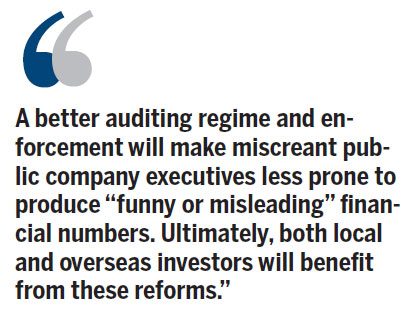'Funny' financial figures harming city's reputation
Updated: 2014-04-09 07:05
By Fung Keung(HK Edition)
|
|||||||||

Hong Kong's reputation for honesty has been undermined by some listed companies' reporting "funny or problematic" financial numbers - including earnings. We must try to stop this trend before it leads to more serious problems.
In 2013, a total of 82 companies listed on the Hong Kong Stock Exchange were found by their auditors that their earnings or other financial numbers were suspicious. Auditors refused to sign off their interim or annual financial reports (in accounting language this is called a "clean opinion"). Companies with problematic financial numbers in 2013 were 650 percent higher than the 11 in 2008. This sharp increase in the number of miscreants is worrying, if not frustrating. It took decades to develop Hong Kong's reputation as a major financial center. Let us hope these straying sheep will be herded back into line.
In short, we need a powerful and strong shepherd.
If audit firms discover discrepancies in public companies' financial statements, they can "reserve their opinions" or "refuse to express their opinions". Experts say that when investors see such remarks by auditors they should pay closer scrutiny to the companies' finances before they invest in them.
According to a local newspaper survey, 90 percent of listed companies who had said in their audit reports they had problematic or "funny" financial numbers in 2013 were non-State-owned enterprises on the mainland. There has been a flurry of mainland companies seeking listings on the local bourse in recent years.
The newspaper survey revealed that one mainland firm, which lost HK$2.3 billion in 2013, but insisted on making acquisitions, saw its share prices drop 54 percent after the audit firm refused to give it a "clean opinion". In another case, the audit firm stated it could not ascertain the "accuracy" of the listed company's account receivables. This mainland firm's share price fell 40 percent after the auditor released its opinion.

The rush to list on Hong Kong's bourse and listed companies' taking advantage of an uncertainty over local audit firms' and their supervising body's future could be reasons for the rise in public companies reporting dubious financial statistics.
A British study in late 2013 found that Hong Kong's self-regulatory system was outdated, while other markets had carried out more aggressive reforms over the past decade. In the 40 world markets under study, one or more non-accountancy bodies have been set up to regulate or supervise auditors - including oversights in investigation and law enforcement.
A power struggle, however, appears to be ongoing between the government and the Hong Kong Institute of Certified Public Accountants (the accounting institute). Currently, the government is canvassing industry views on turning the Financial Reporting Council, established in 2006 by the government, into a regulatory body in 2015.
In contrast to the government's wishes, the accounting institute insists it retains its regulatory roles in training, licensing and standard-setting for accountants. In the US, these functions are handled by a non-accountancy group. An accounting institute executive, quoted in a local English daily, said "we need to reform our system to match international standards. But we do not necessarily need to go for the US model."
If the government has its way, in 2015 a law change will scrap many of the accounting institute's regulatory powers and functions, which include the disciplining of accountants found to have been guilty of misconduct. These regulatory powers will be shifted to the Financial Reporting Council.
Let us hope the government and the accounting institute will reach some form of comprise to split the workload and powers between the accounting institute and the Financial Reporting Council. A better auditing regime and enforcement will make miscreant public company executives less prone to produce "funny or misleading" financial numbers. Ultimately, both local and overseas investors will benefit from these reforms.
The author is coordinator of the B.S.Sc in financial journalism program at Hong Kong Baptist University.
(HK Edition 04/09/2014 page9)